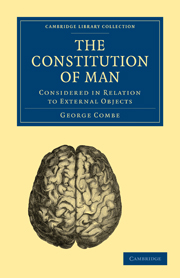Book contents
- Frontmatter
- PREFACE
- Contents
- CHAPTER I ON NATURAL LAWS
- CHAPTER II OF THE CONSTITUTION OF MAN, AND ITS RELATIONS TO EXTERNAL OBJECTS
- CHAPTER III TO WHAT EXTENT ARE THE MISERIES OF MANKIND REFERABLE TO INFRINGEMENTS OF THE LAWS OF NATURE
- CHAPTER IV ON THE COMBINED OPERATION OF THE NATURAL LAWS
- CONCLUSION
- APPENDIX
- Frontmatter
- PREFACE
- Contents
- CHAPTER I ON NATURAL LAWS
- CHAPTER II OF THE CONSTITUTION OF MAN, AND ITS RELATIONS TO EXTERNAL OBJECTS
- CHAPTER III TO WHAT EXTENT ARE THE MISERIES OF MANKIND REFERABLE TO INFRINGEMENTS OF THE LAWS OF NATURE
- CHAPTER IV ON THE COMBINED OPERATION OF THE NATURAL LAWS
- CONCLUSION
- APPENDIX
Summary
Note I. NATURAL LAWS. Text, p. 1.
In the text it is mentioned, that many philosophers have treated of the Laws of Nature. The following are examples:
Mr Stewart says, “To examine the economy of nature in the phenomena of the lower animals, and to compare their instincts with the physical circumstances of their external situation, forms one of the finest speculations of Natural History; and yet it is a speculation to which the attention of the natural historian has seldom been directed. Not only Buffon, but Ray and Dekham, have passed it over slightly; nor, indeed, do I know of any one who has made it the object of a particular consideration but Lord Kames, in a short Appendix to one of his Sketches.”—Elements of the Philosophy of the Human Mind, vol. iii. p. 368.
Mr Stewart also uses the following words:—” Numberless examples shew that Nature has done no more for man than was necessary for his preservation, leaving him to make many acquisitions for himself, which she has imparted immediately to the brutes.
“My own idea is, as I have said on a different occasion, that both instinct and experience are here concerned, and that the share which belongs to each in producing the result, can be ascertained by an appeal to facts alone.”—Vol. iii. ch. 338.
Montesquieu introduces his Spirit of Laws by the following observations:—“Laws, in their most general signification, are the necessary relations derived from the nature of things.
- Type
- Chapter
- Information
- The Constitution of ManConsidered in Relation to External Objects, pp. 297 - 319Publisher: Cambridge University PressPrint publication year: 2009First published in: 1828



